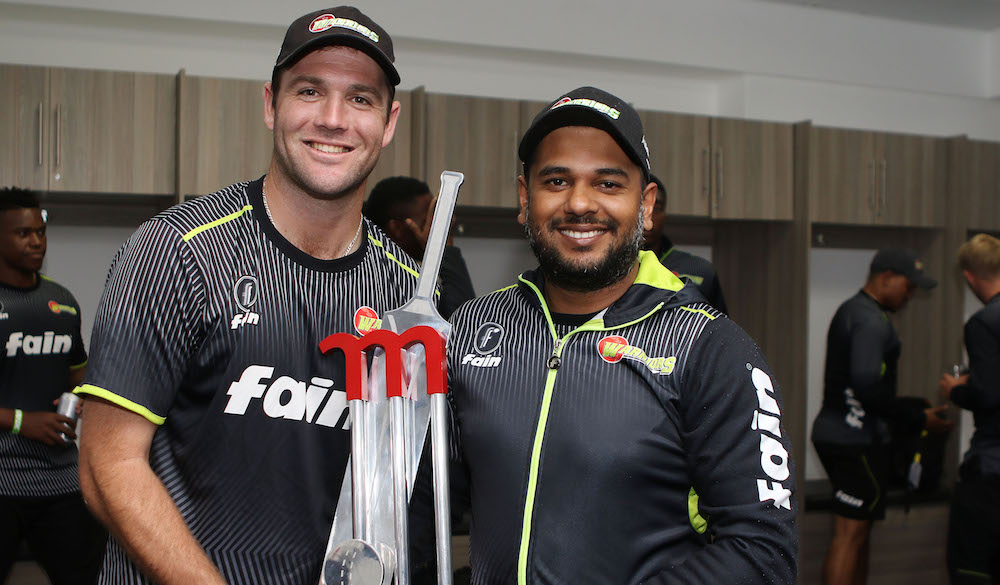Former Dolphins and KwaZulu-Natal left-hand bat (and SA U19 captain), Rivash Gobind, is the head coach for the Warriors and assistant coach of the Nelson Mandela Bay Giants.
WORDS: KHALID MOHIDIN
Tell us a bit of background to your career?
I played for three years in the SA U19 side. I played with the likes of Hashim Amla, Jonathan Trott, Albie Morkel, Graeme Smith, Johann Myburgh, Thami Tsolekile and Stephen Cook.
What are some of your regrets as a player?
Not being able to kick on to a higher level and playing a lot more provincial and franchise cricket, but there were many reasons for that. Some of those reasons are exactly why I got into coaching now. I managed to take all those learning and experiences and take them into coaching.
A particular moment that stands out during your playing career?
Making my debut for KwaZulu-Natal was very exciting for me. I had the opportunity to play with legends of the game – Lance Klusener and Shawn Pollock – and it was very exciting as a youngster. Growing up, all I wanted to do was play cricket, so to achieve that was memorable.
What motivated you to become a cricket manager?
There are a lot of learnings I took out of my career. Like the majority of the cricketers that you as a coach come into contact with, there are very few outstanding ones and there’s a lot out there in the middle that you as a coach can have an influence over. Me as a player, I had my own flaws and areas I needed to work on. But I think understanding that, with the correct guidance maybe things could have been different for me and many guys I played with. That’s some of the key conversations we had as a player and even now I keep in contact with a lot of them.
The guidance that the coach provides is so important to the development of young players, especially. That’s something I have tried to use. I really enjoy working with young guys because I feel you can make a real impact on them, especially in our system. We produce so many quality young players, so the messages they receive when they come out of school and are breaking into professional cricket, if that is handled in the correct manner it will go a long way to help them build a base to have a sustainable career.
What are the crucial technical aspects you have brought into your managerial career?
I’m not so much a technical coach. Technique is something that is very individualised and varies from player to player. There are some basics of the game that if you read a textbook or go on YouTube anyone can get a grasp of. Coaching for me is more getting guys to understand what is required and to help facilitate that by creating the right environment for them where they can feel comfortable to succeed, experiment and grow. With regards to technical coaching, there is a basis for it and the basics don’t change from U13 to professional cricket. I find that coaches get caught up in the technical side of things, which is a small part of it. It is important, but there are other ways to maintain the improvement of players.
What has been the biggest challenge as a young manager of such an experienced side?
The big thing for me is always my relationship with players. I’m very lucky to have played with a lot of these guys as well and I know them by being around the franchise system for a while, so building that trust there was a foundation for me to work with before I took over. I also find being young I can connect with the younger guys that are coming out of school – I’m not that old – and a lot of the things they relate to in terms of social media, popular culture, music and movies, so there’s some sort of connection there.
Give me your thoughts on the Mzansi Super League? Are you a little bit envious that you never had a tournament like this in your playing days?
I’m definitely envious because it creates opportunity and gives players another platform to showcase their skills. From a player’s perspective, it’s unbelievable, and we have seen the benefit of it in the IPL, CPL and the Big Bash. Being involved with the team in the last few weeks I could see the benefit it will have. As a coach, it also gets me out of my comfort zone as I’m working with different players, different styles and ideas. It reinforces some of the things I’m doing well and gives me other ideas that I can implement with my own franchise.
It’s massively important for South African cricket that it is successful, and I’m sure it will be with the number of Proteas involved. Hopefully, a few names who were not household names before will put their names up in lights and build a reputation for themselves.
Sinethemba Qeshile has been a revelation for you this season. What are the qualities that stand out to you about the young player?
I’m very impressed with his maturity for a young guy. He has had some success initially, but it’s a work in progress for him. What I have liked is the way he dealt with a couple of hiccups on the road. He has maintained a level character which is a great trait to have as a professional – he doesn’t get too high when he does well and doesn’t get too low when he does poorly. As a coach I don’t have to manage him with his energy and output, it’s pretty standard. He has a lot of potential and we are very excited about him, but he has to take it step by step. His four-day cricket is probably his best format now, but he will be getting a chance in the Mzansi Super League and I will be following it with great interest.
Any other young talents you are excited about?
We have Lutho Sipamla as well, who played every game for us this season. He just came out of the national academy and is fitter and stronger than he was. He also has all the traits character-wise to have a long career. Another player is Matthew Breetzke, who we know already has a big reputation in South African cricket. He’s someone we are growing, and hopefully when we give him an opportunity he will take it. We also mustn’t forget Anrich Nortje, who is only 25 now, and although he always had potential, now he is adding the performances and I don’t think it will be too long until we see him in the green and gold.
Some may say that the Warriors overachieved last season. How do you plan to maintain or improve on last season’s successes?
With regards to ‘overachieving’, if you ask the other franchise teams when they play against us they don’t expect to just roll the Warriors over at any stage. That’s a little bit of a perception that is probably incorrect. It is something I tried to address with the players, because sometimes that’s actually a nice title to have because then you don’t put too much pressure on yourself as people are not expecting too much of you, so whatever you do is seen as a bonus and guys get happy if you are average.
I want to try and change that mindset and I know the players also want to change that mindset. We want to build on the foundations that were laid and to challenge the status quo. We realised that we are really good especially in the white-ball format and we showed in four-day cricket that we can compete. The biggest thing is to get consistency in our performance and once we do that we can be taken seriously as title contenders.
Jon-Jon Smuts spoke about his disappointment with the number of Warriors players in the national setup. How do you plan to help the players take the next step?
Everyone wants to win, and those are the type of guys who get national contracts. We are trying to change that mindset for ourselves first. Part of it may come from the ‘underachievers’ or ‘overachievers’ tag talk and then people start to view you like that. We certainly have some talented players in the Eastern Cape compared to the rest of the country – I don’t think there is better quality, to be honest. It is up to them to put in the performances and up to me to create an environment for them to achieve that for themselves.
Photo: BackPage Pix







